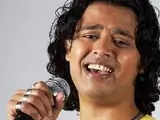Raja Hasan Sagar – a phenomenon in the making
He has been dubbed a Sufi slash Folk singer. Some say he's a Kailash Kher and Sukhwinder Singh clone. Some even call him non-versatile. But, even his detractors cannot deny that Raja Hasan has topped thrice in a row in public votes. They cannot miss the nearly palpable craze of the studio audience that chants his name whenever he comes onstage – an audience that calls for encores to songs like Allah ke Bande and Maa Tujhe Salaam.
So the question is, what makes Raja Hasan work? I have done a brief and objective analysis examining the factors that are possible contributors to his success.
Been there, done that
Raja is no stranger to the Indian music industry according to a blog article. His father Rafiq Sagar is a popular folk singer in Bikaner and has even sung a song for Bappi Lahiri in Pyara Dushman. This connection has most likely given Raja a very early understanding of an industry where only a handful of singers can truly make their living off music alone.
However, his father's connection was not enough as some might think. Raja has had his own share of struggles trying to penetrate into the industry. By his own sheepish admission, he had once attempted to meet Salman Khan posing as a music director. While Raja has made light of the incident and recalled it with much amusement, one cannot deny that he has had more than just musical training in his twenty-six years.
His entry into Sa re ga ma pa was no easy feat either – he gained entry through the Eklavya (the more politically incorrect term would be "Standby") Gharana, he was eliminated by mahaguru Anandji and left at the mercy of public votes during the Bramhastra round. In spite of all the odds against him, Raja fought. And the public likes a fighter.
The R-Factor
He floors most of his fans with an endearing, almost sheepish smile and a humble attitude. But, Raja obviously not an innocent. He is well aware of his unique charm factors and uses them whenever he can to garner votes. He's a natural storyteller who uses anecdotes from his own life to connect with the audience – sometimes to evoke sympathy, sometimes to evoke humour. Much like a well-seasoned politician, one might say!
Nevertheless, there is one aspect about him which overshadows any of my natural aversion to politicos. It is the fact that Raja never takes anything for granted. He appears to be genuinely relieved each time Aditya Narayan reveals a green light in his favour. I think that Raja's humility forms a strong component in his X-Factor or should I say R-Factor?
Voice and volume
When it comes to Raja, voice and volume go hand in hand. Gifted with powerful vocals, this man could easily make announcements in a small football stadium without a microphone and still be heard by the spectators in the last row. So what? There are many singers with loud and powerful vocals (hint, hint: Sukhwinder Singh and Kailash Kher)
However, what makes Raja stand out is the simple fact that he connects. His storytelling capabilities transcend political yarns. They suffuse his songs and make them come alive. Yes, song selection is critical in such aspects and Raja is smart enough to consistently pick songs he is especially good at and gives, if I may quote Himesh Reshammiya, "mind-blowing, 20 20 20" performances. His detractors may say he's a clone of Mr. Singh or Mr. Kher. Nonetheless, that is akin to saying Shaan and KK are Siamese Twins just because they sing in the same genre of music.
Considering the format of the competition, I'd say that sticking to his strengths has been a wise move. A single mistake can prove to be fatal in public votes and Raja and his mentors know that very well. As long as the public is not bored, why try to attempt something completely outside his comfort zone and end up giving at best mediocre performances?
Even Sonu Nigam had his Mohammad Rafi clone phase before he found his own unique style. Raja at least attempts to modify each song slightly, leaving his own imprint on a song, be it Kacche Dhaage or Maa Tujhe Salaam.
Packaging
He is called "Raja Hindustani, Bikaner ka Raja Hasan". The packaging itself works in his favour as it captures two large audiences. One: the audience of Bikaner (hometown of Indian Idol Sandeep Acharya) and Two: Hindustan itself. This may be an international competition, but it's also highly likely that there are more Indian votes in comparison to International votes if one considers the fact that the channels earn through SMS voting.
It is Raja's luck that Aamir Khan made a movie in the name Zee TV calls him, but what also is true is the fact that the strategy of "Provoking Nationalism" plays a role in garnering revenue from a certain sect of the audience which votes for the simple fact that a contestant is from their hometown or their nation. Obviously, if Raja were a mediocre singer, this strategy would be a flop. As it is, Junaid Sheikh from Karachi, Pakistan has been topping in terms of International votes, which shows that Raja has tough competition.
The Mento-Meter
Fondly called the "mental meter" by some, this measurement scale is used by the Sa re ga ma pa mentors to rate a contestant's performances. Though it is true that the Mento-meter is at best inconsistent and at worst fanatical, it is possible that a certain section of the audience is affected by the assessment of the magical mentors, who have consistently rated Raja with multiples of tens.
To me, Raja Hasan represents a genre which is finally getting its due in Indian music, at least in terms of musical talent hunts. He silences the room with a single high note. He may not have the conventional playback voice, as some people call it. Neither do Himesh Reshammiya or Kailash Khair. Yet, he is a phenomenon in the making.
I end this rather long analysis by clarifying that this strictly represents my points of view.
You are also free to disagree with me…if you read my analysis without turning into a clone of Rip Van Winkle or Kumbh Karan. 😛
Please put forth your own views about why YOU think Raja is appealing.



































